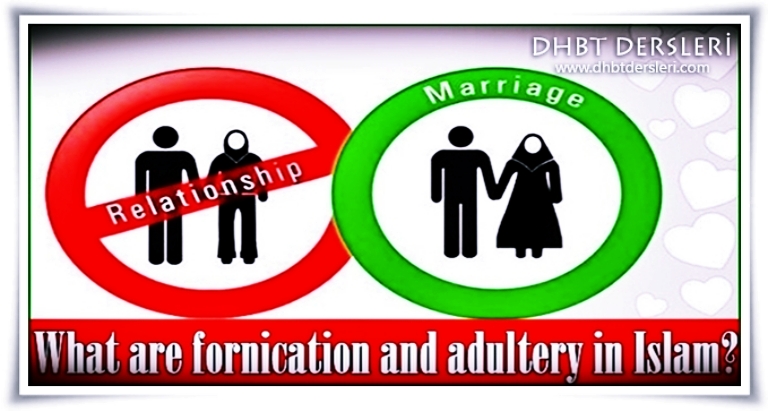Islam defines any physical and sexual relationship out of wedlock or out of marriage (in case of singles) as adultery. The Qur’an prohibits any kind of adultery and fornication, and qualifies it as a breach of moral boundaries (‘Isra’ 17:32).
What are Fornication and Adultery in Islam?
The Qur’an does not only prohibit adultery, but also commands “Do not approach unlawful sexual intercourse” (‘Isra’ 17:32) to prevent Muslims from even getting into a situation, which could potentially lead to adultery (fornication).
Prohibiting such unlawful acts introduces norms, rules and regulations into otherwise disorderly and unlawful male-female relations.
The ban also introduces a distance between unrelated opposite sexes, lest their feelings soil under such unlawful relations.
What is the punishment for fornication and adultery?
Any kind of unlawful sexual act is considered sin in Islam, because whoever commits it, he/she does so in violation of Allah’s prohibition and transgressing a boundary He has set.
In case such an act is committed in people’s presence or awareness, it is not only a sin, but also a crime.
One is to sincerely repent before Allah for the sin of fornication (adultery) while he/she is still alive if they want to be forgiven (Zumar 39:53).
If someone stands before Allah on the Judgment Day with the sin of fornication (adultery) he/she did not repent for, Allah may cleanse him/her by forgiving if He so wills, or Allah may cleanse him/her by punishing if He so wills.
According to Islamic teachings, the Hellfire will touch a human only if he/she bears a sin to be cleansed. And the phrase “if He wills to forgive” does not entail an arbitrary act from Allah; divine forgiveness in question depends on said sinners’ good and bad deeds committed during his/her lifetime on Earth (Qari`ah 101:6-9).
The following Qur’anic âyah—“… the adulteress and the adulterer – flog each of them with a hundred stripes…” (Nur 24:2)— directs Muslims’ actions in the event of an act of adultery (fornication) was explicitly and irrefutably established and confirmed by four witnesses (Nur 24:13).
Just like the Qur’an establishes a punishment for unlawful sexual intercourse, it also establishes a harsh punishment for slandering one committed that awful sin (Nur 24:4).
What does the Qur’an say about homosexuality?
The Qur’an calls homosexuality “extreme” and “transgression” (fâhishatan), and qualifies it as a kind of adultery (Naml 27:54). The transgressed boundary and violated norms are fitrah and creation.
Because the sexual passion Allah granted humans with is primarily meant for continuing human progeny. Homosexuality, obviously, contradicts this fundamental purpose; therefore, homosexuality contradicts humans’ fitrah.
Anything that contradicts or does not conform to the human fitrah is fakhshâ (transgression).
Like anything else that contradicts the fitrah and purpose of creation, homosexual relation is an anomaly, which is obviously haram (impermissible).

































